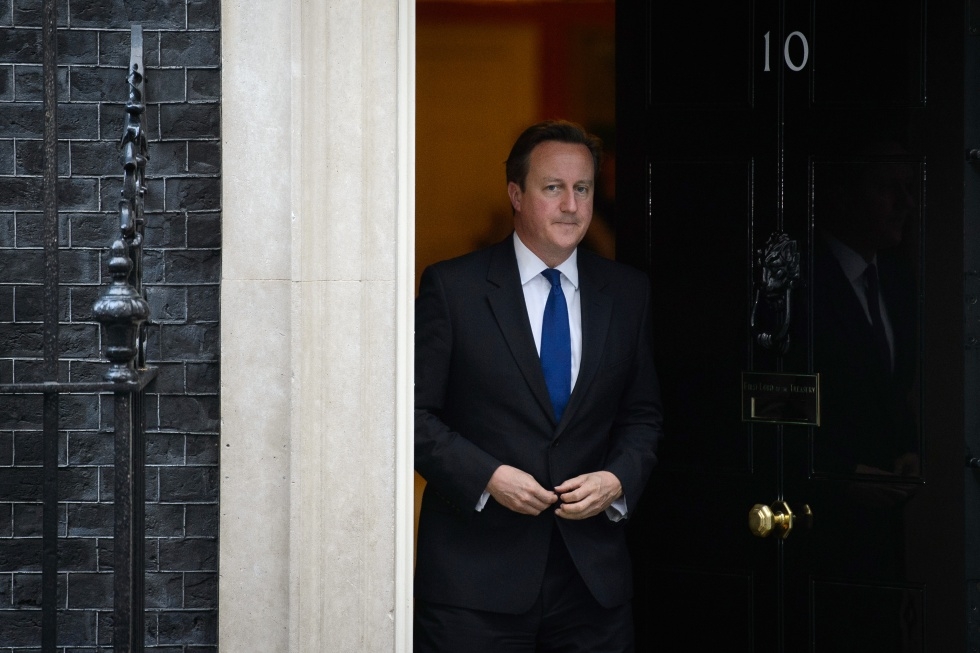British Prime Minister Cameron to abstain on Palestine statehood vote

UK Prime Minister David Cameron has said that he will abstain on a vote in parliament on whether the UK should recognise the state of Palestine.
"I've been pretty clear about the government's position and it won't be changing," said a spokesperson for Cameron.
Current government policy is that the UK "reserves the right to recognise a Palestinian state bilaterally at the moment of our choosing and when it can best help bring about peace".
The Prime Minister has, however, allowed his backbenchers a free a vote on the motion, which many are expected to support.
The British Labour Party is suffering an “internal revolt” over a 13 October vote
Pro-Israeli members of the party are said to be “furious”, according to The Independent, at leaders who have told shadow ministers they must support the motion, which says “this House [of parliament] believes that the Government should recognise the state of Palestine alongside the state of Israel.”
Lobby group the Labour Friends of Israel (LFI) has said they believe the decision to support the motion “goes far beyond the party’s stated position that Palestinian statehood must be a part of a process of direct negotiations between the Palestinian Authority and the Israeli government”.
Supporters of LFI include shadow Chancellor Ed Balls and shadow ministers Caroline Flint, Jim Murphy and Liam Byrne.
Shadow Foreign Secretary Douglas Alexander is said to have made the decision for the party to support the motion. Alexander has previously said “Palestinian statehood is not a gift to be given, but a right to be recognised.”
LFI are now “frantically” lobbying party leader Ed Miliband to reject Alexander’s decision, according to The Independent, who reported several shadow ministers will not turn up to vote if the leadership refuses to do a U-turn.
“To say that there is a row going on is putting it very mildly. People are furious. This is an attempt to rip up 13 years of carefully calibrated policy,” one senior pro-Israeli Labour MP told the newspaper.
A pro-Palestine Labour lobby group has welcomed the move to unilaterally recognise Palestinian statehood and described it as “long overdue.”
“The arguments in support of Palestinian statehood are well rehearsed and the British government has already accepted Palestine’s right to statehood and agreed that Palestine has all the attributes worthy of a state,” the Labour Friends of Palestine and the Middle East said in a statement.
The Israeli Labour Party said in a letter to its sister party in London that “unilateral recognition of Palestinian statehood does nothing to advance” the peace process. However, LFPME said it will pressure Israel to engage more meaningfully if the process is to be restarted.
“Not only will recognition help the Palestinian people to realise fundamental rights and freedoms which have for too long been denied, but will help reinvigorate negotiations between Israel and Palestine.”
The lobby group pointed to summer protests against Israel’s recent 51-day assault on Gaza as demonstrating “Palestine is now a mainstream political issue.”
The Palestine Solidarity Campaign (PSC) estimated 100,000 people joined a 19 July protest and around 60,000 on 26 July.
The rallies called for an end to the Israeli army offensive in Gaza, which killed more than 2,000 Palestinians, mostly civilians, and left 71 Israelis, mostly soldiers, dead.
Long-time supporter of Palestinian rights Jeremy Corbyn, Labour MP for Islington North, said support was strong from constituents urging politicians to approve Monday’s motion.
“Palestine supporters…are flooding MPs with emails supporting the call for Palestine to be given the full recognition it has been denied ever since the end of the Ottoman Empire,” he wrote in the Morning Star online. “13 October gives a chance for Britain to finally break with US policy on the Middle East and give full political recognition to Palestine.”
Richard Burden, Labour MP for Birmingham Northfield and Chair of the Palestine All Party Parliamentary Group, told Middle East Eye that the vote was a necessary sign that the UK supported Palestinian self-determination.
"Our view is very simple: the first thing that must be done is to establish the principle of equality between Israel and Palestine. Israel is a recognised state," he said.
"The right to self-determination has not been negotiable for Israelis themselves. What were are saying is there needs to be that principle of equality and parity in international community. That is not something that the international community should see as a gift but rather as a right for Palestinians.”
He said the UK should be seen a progressive partner for peace in the region.
“By the UK parliament expressing that it wants to see Palestine recognition, it will show leadership in the area and underline UK positon as an honest broker in the process," he said.
In spite of the warnings of the Israeli Labor Party, a number of Israeli politicians, ex-ministers and academics have signed a public letter calling on the UK Labour Party not to waver over Palestinian statehood.
"We, Israelis who worry and care for the well-being of the State of Israel, believe that the long-term existence and security of Israel depends on the long-term existence and security of a Palestinian state," said the letter, according to +972 magazine.
"For this reason we the undersigned urge members of the UK parliament to vote in favour of the motion to be debated on Monday 13th of October, 2014, calling on the British Government to recognize the state of Palestine alongside the State of Israel."
Leader of the left-wing Meretz party Zehava Gal-On, also slammed the Labor Party for its opposition to the UK vote.
“One cannot say that Netanyahu won’t promote a diplomatic initiative, but then, when the world tries to lead a UN motion, help Netanyahu torpedo it. Labor is conducting itself like another foreign office for Netanyahu’s government,” she said, according to +972 magazine.
Middle East Eye propose une couverture et une analyse indépendantes et incomparables du Moyen-Orient, de l’Afrique du Nord et d’autres régions du monde. Pour en savoir plus sur la reprise de ce contenu et les frais qui s’appliquent, veuillez remplir ce formulaire [en anglais]. Pour en savoir plus sur MEE, cliquez ici [en anglais].




